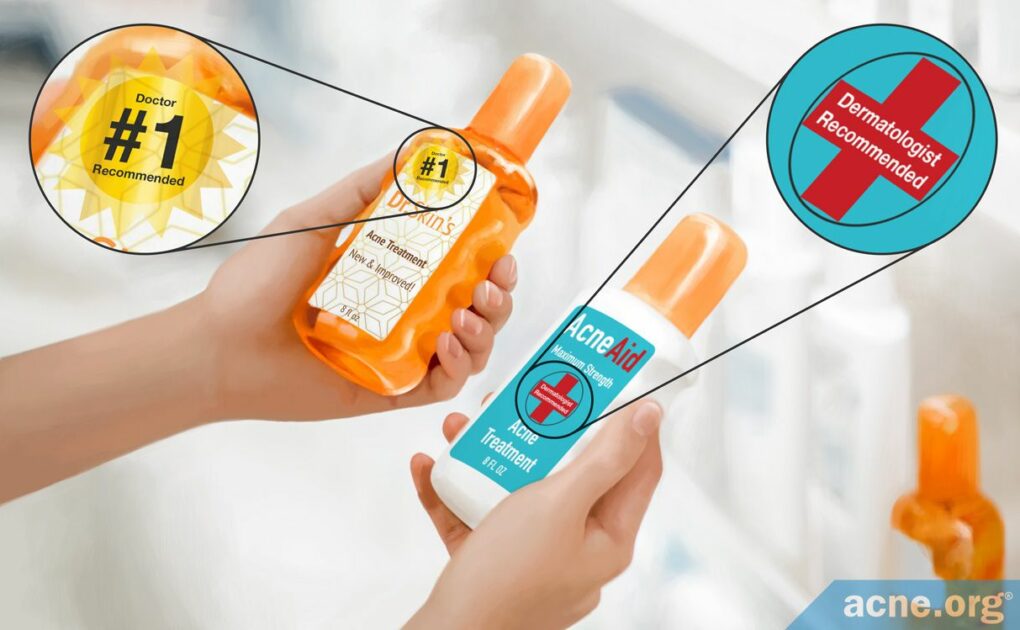Not Much. Read up on Products Before Buying and Use Your Own Judgement.

The Essential Info
Marketers of over-the-counter products often use labels like “#1 Doctor Recommended” or “Dermatologist Recommended” to increase consumer trust and drive up sales. In the U.S., this sort of labeling is regulated, but regulations leave enough wiggle room that such claims may have less meaning than it appears.
Instead of trusting these label claims, do your research and use your own experience to select products that will work for you. In the skincare industry in particular, a healthy dose of skepticism is in order.

The Science
- Who Oversees Labels and Ads for Over-the-counter Cosmetics?
- People Tend to Trust Products Recommended by Doctors
- Why Doctors Don’t Always Know Best
- The Bottom Line
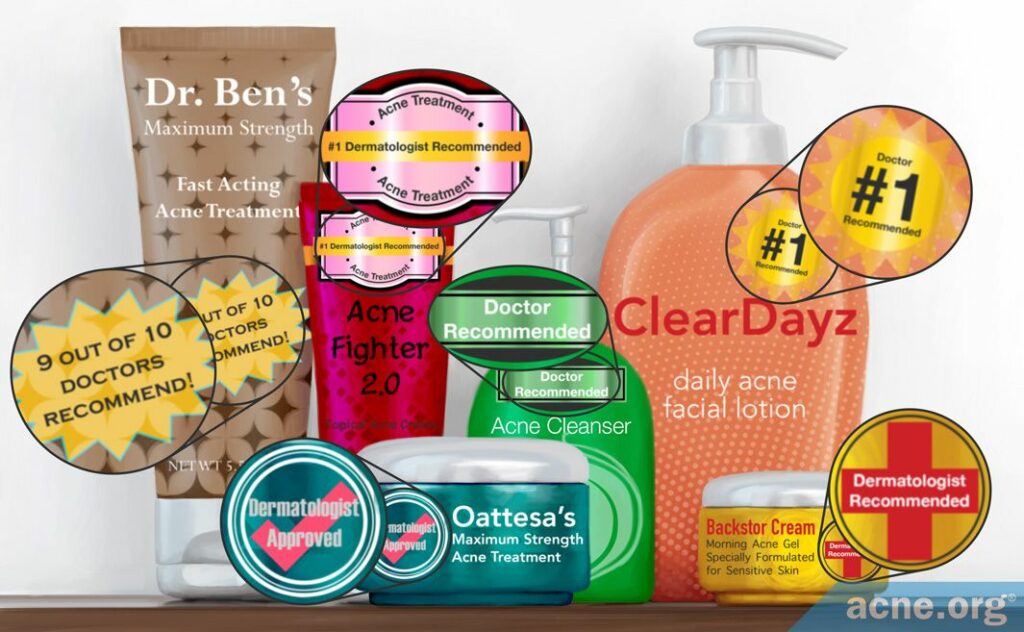
As you walk the aisles of your drugstore, you may notice that many over-the-counter skin care and makeup products sport the label “#1 Doctor Recommended” or “Dermatologist Recommended.” Such claims help to increase sales because people tend to trust brands that come with a doctor’s seal of approval.
Unlike certain claims like “hypoallergenic” or “non-comedogenic,” which are completely unregulated and therefore unreliable, claims like “Doctor Recommended” do need to have some basis in reality. Regulators in the U.S. do expect companies to provide “reasonable” evidence to back up such claims. However, the regulations allow enough leeway that you cannot tell by looking at a product just how much evidence is behind it. In some cases, a label like “#1 Doctor Recommended” might mean that the product underwent rigorous testing in large clinical trials. In others, it might only mean that the manufacturers made a brief survey of a handful of doctors. In some instances, it might even mean that certain doctors receive financial compensation for recommending the product over others.
In other words, over-the-counter products labeled “#1 Doctor Recommended” are not necessarily safer or more effective than products without this label. In fact, the term is vague enough that multiple rival products may all be labeled “#1 Dermatologist Recommended.”
The bottom line here is that when it comes to choosing what to buy, do your research and use your own judgement to find something that will work for you.
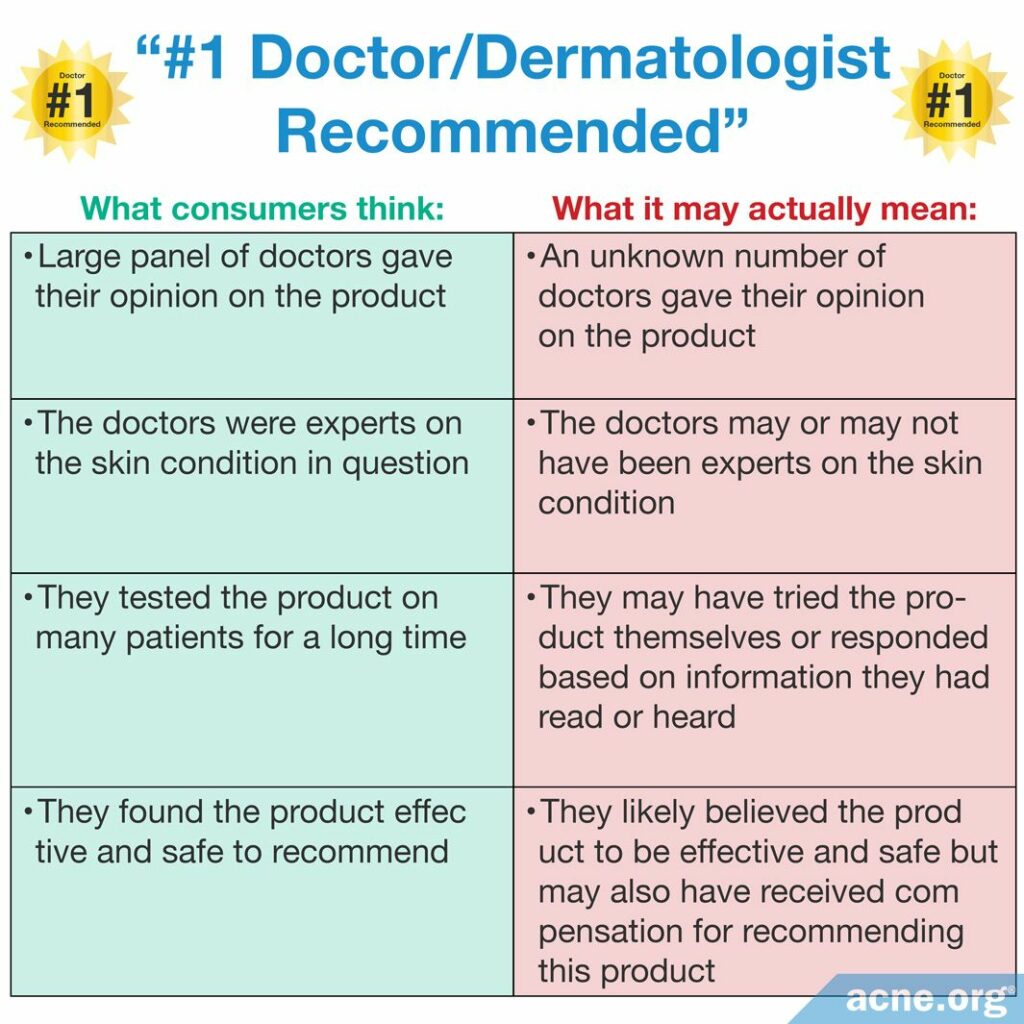
Who Oversees Labels and Ads for Over-the-counter Cosmetics?
In the United States, two agencies regulate the labeling and advertising of over-the-counter skin care and makeup products, and when it comes to the claims like “doctor recommended,” the FDA has nothing to say about it, but the FTC does.
1. The U.S. Food and Drug Administration (FDA) regulates the labeling of food, drugs, and cosmetics to ensure consumer safety. The FDA:
- Requires that cosmetic products possess a label listing the ingredients and that all ingredients be safe for use.
- Does not require manufacturers to test cosmetics before selling them. The exception is color additives, which must be tested and approved by the FDA before they reach the market. In general, manufacturers do not need to prove their cosmetics are safe but are legally responsible if any products turn out to be harmful.1 – 3
2. The Federal Trade Commission (FTC), under the Federal Trade Commission Act (FTCA), regulates the advertising of food, dietary supplements, cosmetics, and over-the-counter drugs to ensure that companies make reasonable claims in their ads and commercials. The FTC:
- Requires companies to have a “reasonable basis” for their claims before running ads.
- Expects companies to support their claims by “tests, studies, or other scientific evidence that has been evaluated by people qualified to review it.”4
Expand to read details of article on FDA and product labeling

When it comes to the label “#1 Dermatologist Recommended,” the FDA has nothing to say about it. As long as the product is free of banned ingredients and includes a complete ingredient list, the FDA does not evaluate any other claims on the packaging, such as “Doctor Recommended,” “Hypoallergenic,” or “Fragrance-free.”5 According to an article published in 2018 in the Journal of Dermatological Treatment, “most of the dermatologic claims made by cosmetic products have minimal FDA regulation and may be misleading to the consumer.”5
The FTC expects manufacturers to be able to back up their claims that a product is “#1 Doctor Recommended.” Ideally, the manufacturer should provide the results of a national survey in which doctors responded to questions about their experience in their medical practice. In other words, to say that a product is “Doctor Recommended,” the manufacturer should verify that doctors across the country actually do recommend the product to their own patients. Again, ideally, the survey should include a random, diverse sample of doctors and be conducted by a company that specializes in surveys.6 In reality, however, the regulations leave enough wiggle room in how manufacturers conduct surveys and in exactly what questions they ask that it is difficult to draw any conclusions from the claim that something is “#1 Dermatologist Recommended.”
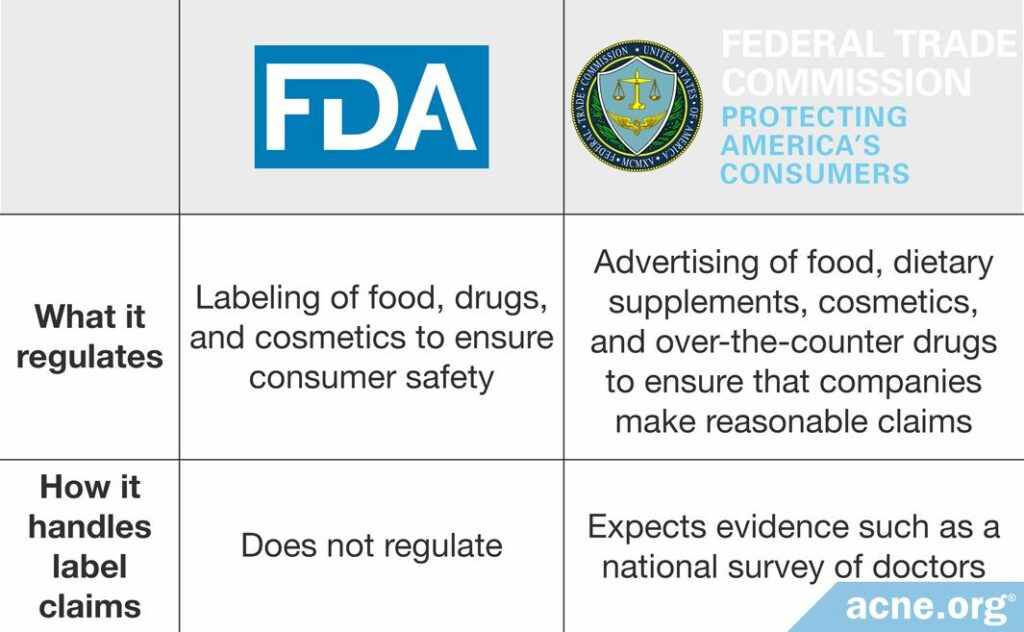
So why do companies keep using these labels if they don’t mean much?
People Tend to Trust Products Recommended by Doctors
Marketers have long known that people tend to trust a brand more if it comes with a doctor’s stamp of approval. Several studies have shown that people perceive a doctor wearing a white coat as particularly professional and scientific.7,8
In the 1950s, some tobacco companies in the U.S. used this fact of human psychology to promote their products. Their advertisements depicted doctors in white coats holding packs of cigarettes and stated that doctors preferred their brand of tobacco over others.9
Consumers today still tend to assume that a qualified doctor knows what is best for them. Unfortunately, this is not always the case.
Why Doctors Don’t Always Know Best
Even if a company’s claim that a certain product is “Doctor Recommended” is absolutely truthful, this still does not mean you should blindly place your trust in the product. Most doctors are well-intentioned and ethical. Even so, there are several important reasons why doctors’ recommendations can be imperfect:
- The pace of new research and discovery makes it almost impossible for doctors to keep up with the latest findings
- Many doctors do not integrate the best available evidence into their practice, relying instead on what has worked for them before, what they learned in medical school, or what they heard in the media
- Even the latest knowledge is incomplete–for example, a drug may have side effects that research has not yet revealed
- In rare cases, manufacturers may conceal or misrepresent evidence of their products’ side effects
- Some doctors receive compensation from companies for recommending particular products to patients10
In other words, products that are genuinely “Doctor Recommended” might not always be the best choice for you. Does this mean you should disregard the advice of your doctor and other health care providers? No. Your doctor will normally have your best interests at heart and will do her best to prescribe an appropriate treatment.
However, when you make purchasing decisions about skin care and makeup products, it is important not to rely solely on your doctor’s or other doctors’ opinions, but to do your own research and take your own experience into account. And when it comes to marketing claims on products that they are “Doctor Recommended,” take these claims with a large grain of salt.
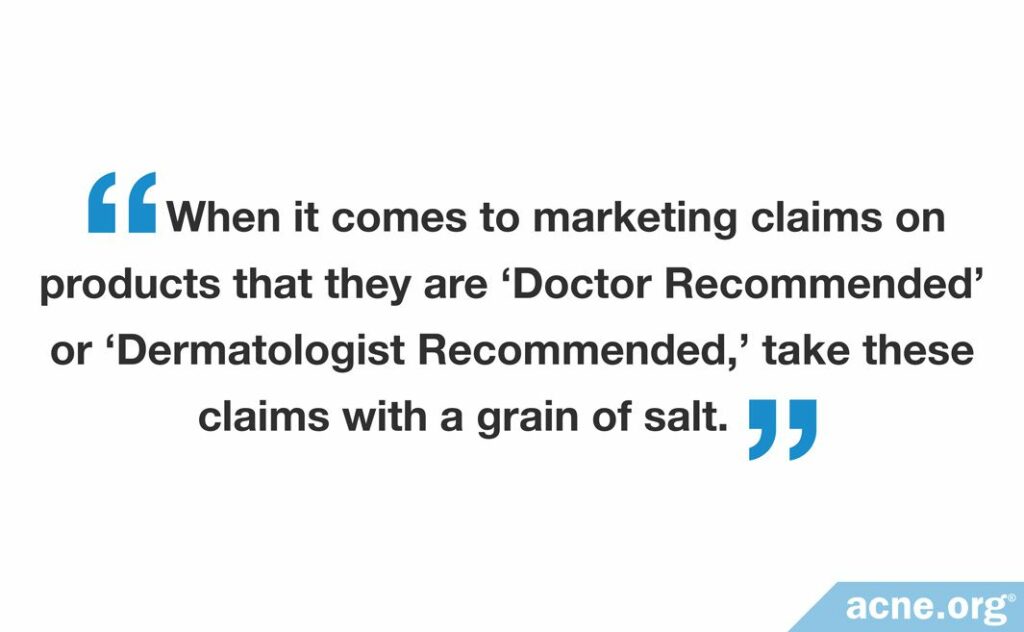
The Bottom Line
The label “#1 Dermatologist Recommended” provides little useful information about a product. Manufacturers make this claim because they can and because they know it will drive up sales. Federal regulations leave enough wiggle room that you cannot take the manufacturers’ claims at face value.
When it comes to making decisions about your health, be your own advocate. Arm yourself with the latest evidence-based information and use your own judgement to select products that will work for you
References
- U S Food and Drug Administration. FDA Authority Over Cosmetics: How Cosmetics Are Not FDA-Approved, but Are FDA-Regulated. https://www.fda.gov/cosmetics/cosmetics-laws-regulations/fda-authority-over-cosmetics-how-cosmetics-are-not-fda-approved-are-fda-regulated
- U S Food and Drug Administration. Labeling Regulations. https://www.fda.gov/cosmetics/labeling/regulations/default.htm
- U S Food and Drug Administration. Cosmetics Overview. https://www.fda.gov/cosmetics/labeling/regulations/default.htm
- Federal Trade Commission. Advertising FAQ’s: A Guide for Small Business. https://www.ftc.gov/tips-advice/business-center/guidance/advertising-faqs-guide-small-business
- Boozalis, E. & Patel, S. Clinical utility of marketing terms used for over-the-counter dermatologic products. J Dermatolog Treat 29, 841 – 845 (2018). https://www.ncbi.nlm.nih.gov/pubmed/29671667
- Michelle C. Jackson. Claiming to be the Best: Understanding How to Substantiate Your Claims. https://www.venable.com/files/Event/3acb39e9-0914-445b-a85e-171f5425f205/Presentation/EventAttachment/4646a584-0a48-42b5-b1aa-382bb4fcc804/Expo_West_2012_presentation.pdf
- Aggarwal, R. The withering shine of white coat. Ann Indian Acad Neurol 15, 63 (2012). http://www.annalsofian.org/article.asp?issn=0972-2327;year=2012;volume=15;issue=1;spage=63;epage=63;aulast=Aggarwal
- Rehman, S. U., Nietert, P. J., Cope, D. W. & Kilpatrick, A. O. What to wear today? Effect of doctor’s attire on the trust and confidence of patients. Am J Med 118, 1279 – 1286 (2005). https://www.ncbi.nlm.nih.gov/pubmed/16271913
- Gardner, M. N. & Brandt, A. M. “The doctors’ choice is America’s choice”: the physician in US cigarette advertisements, 1930 – 1953. Am J Public Health 96, 222 – 232 (2006). https://www.ncbi.nlm.nih.gov/pmc/articles/PMC1470496/
- Irwig, L., Irwig, J., Trevena, L. & Sweet, M (editors). Smart Health Choices: Making Sense of Health Advice. London: Hammersmith Press; 2008. https://www.ncbi.nlm.nih.gov/pubmed/22013602
 Acne.org Products
Acne.org Products